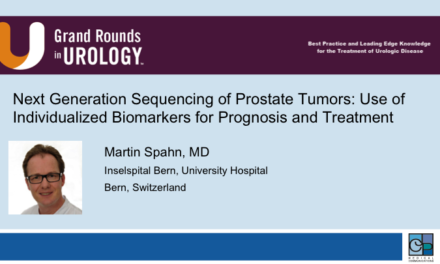Daniel Shoskes, MD, presented “Industry Perspective: AR-V7 Testing for Men with Advanced Stage Prostate Cancer” for the Grand Rounds in Urology audience in May 2022.
How to cite: Shoskes, Daniel. “Industry Perspective: AR-V7 Testing for Men with Advanced Stage Prostate Cancer.” May 2022. Accessed Jan 2026. https://grandroundsinurology.com/industry-perspective-ar-v7-testing-for-men-with-advanced-stage-prostate-cancer/
Industry Perspective: AR-V7 Testing for Men with Advanced Stage Prostate Cancer
Daniel Shoskes, MD, FRCSC, Medical Director in Medical Affairs for Urologic Oncology at Exact Sciences, and Emeritus Professor of Urology at the Cleveland Clinic, discusses AR-V7 testing for men with metastatic castrate-resistant prostate cancer (mCRPC). He begins by noting that mCRPC cannot be cured, but patients with mCRPC often benefit from multiple lines of sequential therapy. Dr. Shoskes explains that when one therapy fails, choosing the next therapy can often be difficult, in part because patients often prefer AR-targeted therapy over taxanes due to the less burdensome side effect profile of AR-targeted therapies. As a result, even though secondary AR-targeted therapy is only effective 22-46% of the time, AR-targeted therapies are administered back-to-back up to 60% of the time. Dr. Shoskes observes that AR variants are a common cause of AR-targeted therapy resistance, and of those variants, AR-V7 is one of the most common and best understood. He defines AR-V7 as a splice variant of the androgen receptor protein which is active without the ligand binding domain, making it resistant to abiraterone, enzalutamide, and apalutamide. Dr. Shoskes then introduces the Oncotype DX AR-V7 Nucleus Detect assay, which he argues can help clinicians quickly direct their mCRPC patients toward the right treatment. He explains that the Nucleus Detect assay detects the AR-V7 protein in the nucleus of circulating tumor cells, is predictive of resistance to AR-targeted therapies, provides easy-to-interpret and actionable results, and only requires a simple blood draw. Dr. Shoskes highlights that the Nucleus Detect assay has been validated in three independent studies, all of which found that it to be predictive of non-response to AR-targeted therapy. He concludes by discussing outcomes, noting that in the validation studies, AR-V7+ patients experienced a 76% survival benefit from being placed on taxane therapy versus AR-targeted therapy.
For more on the role of genomics in prostate cancer risk stratification, visit the Next Generation Learning Center on Genomics and Biomarkers.
ABOUT THE AUTHOR
Daniel A. Shoskes, MD, MSc, FRCS(C), is the Vice President, Global Medical Director of Uro-Oncology at Ferring Pharmaceuticals in Cleveland, Ohio. Dr. Shoskes also serves as Professor Emeritus of Urology at Case Western Reserve University in Cleveland, Ohio. Dr. Shoskes' clinical interests include renal transplantation, chronic prostatitis, chronic pelvic pain syndrome, interstitial cystitis and benign prostatic hypertrophy. Dr. Shoskes’ areas of speciality in Medical Affairs include development of Investigator Initiated Trials Programs, commercial launch of new diagnostic tests in Urologic Oncology, leadership of multifunctional teams, collaboration with Marketing and Sales, training of sales staff and medical science liaisons, development of medical slide decks, and clinical trial design.





